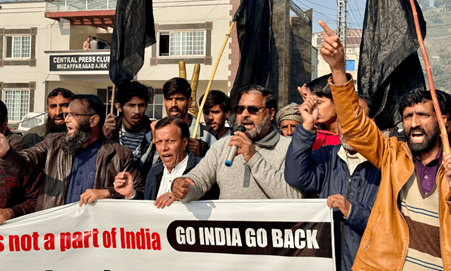India’s relentless claim over Jammu and Kashmir is an assertion of power over a territory whose people have not given their permission, not a statement of sovereignty. As often maintained by New Delhi, Kashmir is not an internal problem of India. It is, rather, a globally known conflict with a convoluted and unresolved past. The fundamental question here is the intrinsic right of the Kashmiri people to choose their own political future, a right that has been constantly denied. India is a participant to a dispute; it is not the owner of Kashmir; its actions throughout the years mirror those of a colonial power rather than a democratic partner.
Resolutions enacted in the United Nations Security Council (UNSC) in the late 1940s and early 1950s define the international nature of the Kashmir conflict. Resolutions like UNSC 47, 51, 91, and 122 amply shown that a plebiscite conducted under UN auspices must decide Jammu and Kashmir’s destiny. Actually, India was the one approaching the UN in 1948 and first agreed to this arrangement. But successive Indian administrations have turned away from their promise over time. Ignoring these resolutions not only violates international law but also betrays India’s own pledges to the people of Kashmir and the world community.
Often using the 1972 Simla Agreement as a cover, India seeks to evade third-party mediation and international scrutiny. This bilateral agreement between India and Pakistan cannot, however, and does not supersede UN Charter or UNSC decisions. The Simla Agreement does not deny the right of the Kashmiri people to self-determination; it just notes the need of a last solution of the Kashmiri problem. Legally baseless and dishonest, using the Simla Agreement as a smokescreen to bury the issue of Kashmir.
The 2019 unilateral move by India to abolish Article 370 of its Constitution, therefore depriving Jammu and Kashmir of its unique status, heightened the conflict and attracted worldwide outrage. This action drastically changed the situation of a region still under legal dispute and broke international standards. Especially, this choice was taken without the approval of the government of Pakistan or the people of Jammu and Kashmir, a major participant in the conflict. Such a unilateral move is very different from the ideas of international law, especially the ban on changing the status of disputed areas without mutual agreement.
India’s actions in Kashmir more and more reflect settler-colonialism. It reflects the traditional colonizing model: conquering territory, eradicating the native people, changing demography, and attesting to legitimacy by military might. Particularly aiming at the Muslim majority population in Indian Illegally Occupied Jammu and Kashmir (IIOJK), there has been an escalated campaign since 2019 to change the demographic composition of the area. India is breaching the Fourth Geneva Convention, which forbids the civilian population of an occupying force being transferred into the region it controls, by giving non-Kashmiris domicile status and helping foreigners to reside.
These political and demographic changes are not just administrative ones; they are also part of a calculated attempt to weaken Kashmiri identity and disembowel its majority. The objective seems to be to permanently alter the political environment of the area such that, should a referendum be conducted, any future reflection of the actual desire of the native people would be absent. This is an act of ethnic erasure dressed under integration, not democracy in action.
India has to instantly undo all unilateral and unlawful activities carried out in Jammu and Kashmir since 1947, including Article 370 abrogation. Then and only then can there be a real conversation about the direction the area is headed. Any Indian claim to democratic ideals in Kashmir sounds empty till that comes about. The world has to realize that without confronting the Kashmir conflict squarely, peace in South Asia is impossible. Only a fair settlement of this problem that respects the commitments given to the Kashmiri people and follows international law would bring about durable peace.
As they say, “you don’t own what you were supposed to share, Kashmir belongs to its people.” Old maps or altered constitutional articles cannot help to justify India’s actions in Kashmir. Ownership implies permission, respect, and legitimacy, none of which India has in Kashmir. India is plaintiff in a pending international conflict, not a landlord. It is long past that the world began to see Kashmir’s people as the main players in this struggle instead of viewing India’s posture as a fait accompli.
History reminds us that while colonists seldom rule permanently, they almost ever give up power on their will. The world community cannot be passive. The pain of the Kashmiris cannot be a reasonable cost for geopolitical convenience. Justice postponed in Kashmir is denied to millions of people who have spent decades under occupation.
India’s claim over Kashmir is colonial rather than constitutional. The people of Jammu and Kashmir will decide their destiny; New Delhi cannot define it. Then hope for long-lasting peace and justice in the area will be realistic.







